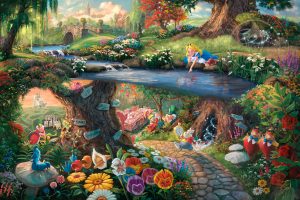It was very exciting to return to Wonderland in Through the Looking Glass. My favorite books as a young girl always took place in fantastical worlds beyond the human experience–Alice’s Adventures in Wonderland, The Wizard of Oz, and The Lion, The Witch, and the Wardrobe immediately come to mind. Outside of books, I became fascinated with creating elaborate worlds with my equally imaginative friends and siblings, ranging from a bustling metropolis inhabited by our stuffed animals, or a far-reaching, Walden-esque frontier retreat circling around my neighbor’s backyard pool (or “Jellybean Lake,” as my friends and I remember it). I relished stories about the Tooth Fairy, woke up early hoping to catch a glimpse of the Easter Bunny every Easter Sunday, and dreamt of traveling to the North Pole on Santa’s sleigh.
Wonderland belongs in the same category of all these imaginative and unique realms dreamt by children. These locations, including Carroll’s mystical setting, remind me of a juvenile version of Northrop Frye’s famous “green world,” in which the natural roles of structured society are reversed for play and chaos. Alice represents the perfect subject in this childish “green world” as she, despite her obvious innocence, readily engages in the nonsensical logic of Wonderland and even subverts her role as a child to act as a mature, motherly figure to the odd characters she meets (such as Tweedledee/Tweedledum and the White Queen). It’s easily for any child, including Alice, to get swept up in the legendary worlds of Wonderland or the North Pole and pretend that these locations, while usually fictitious, are an untapped element of reality. However, it’s important to acknowledge “the Wendy Darling dilemma”: when these children grow up, they come to realize that their imagined realities (or “Neverlands”) are false and non-consequential to their lives. And yet, Wonderland and the North Pole live on with each new generation of wide-eyed children. If these fantastical realms are essentially lies, what purpose do they serve for children? How do they help or hinder a child’s ability to perceive their reality?


I think they might hinder a person’s ability to accept virtual realities as an adult. To believe in virtual realities is seen as childish, and we are only considered grown up when we accept the tales we were told as children are untrue. I think people even nowadays struggle to see the full potential of virtual reality because they assume it is just an immersive video game and they associate childhood with virtual realities.